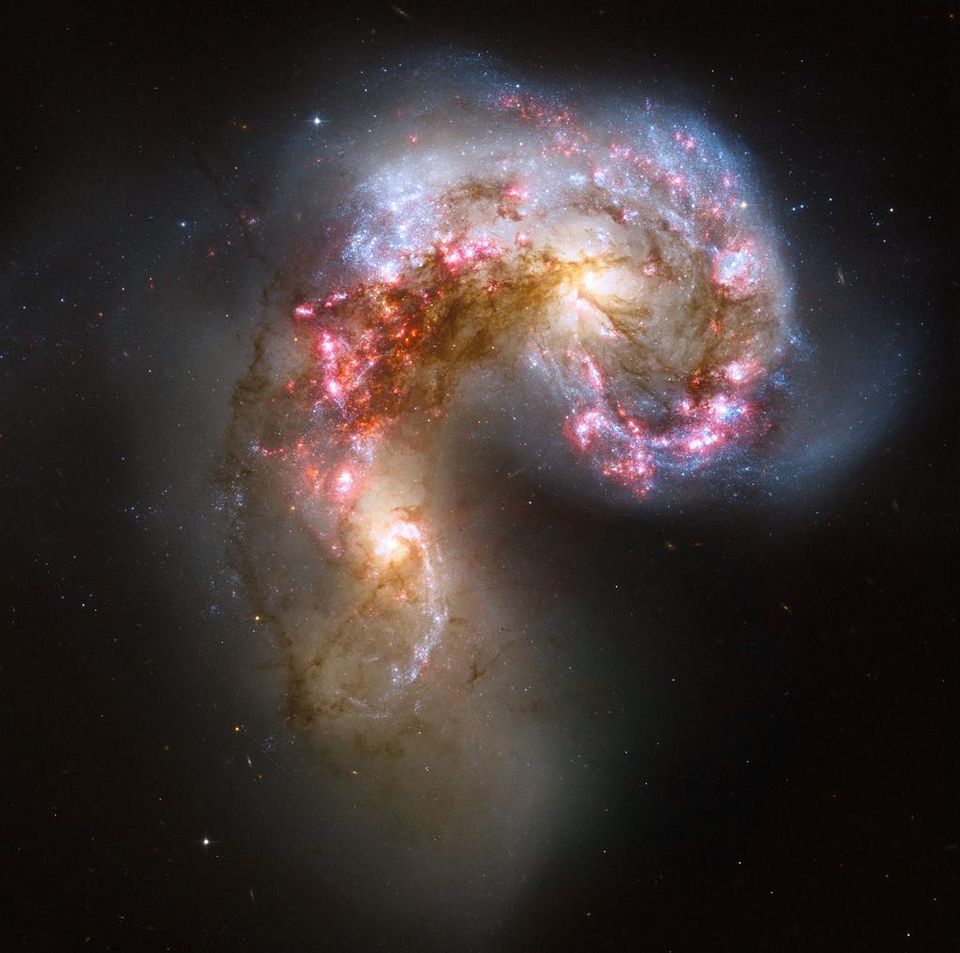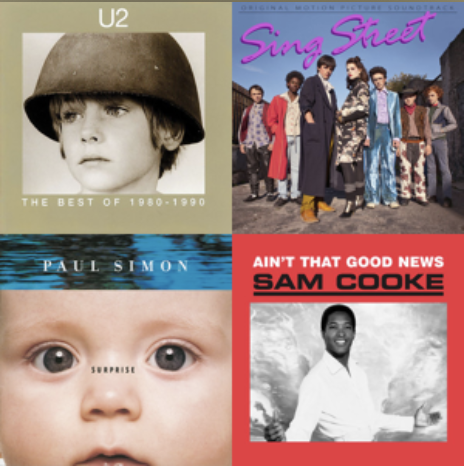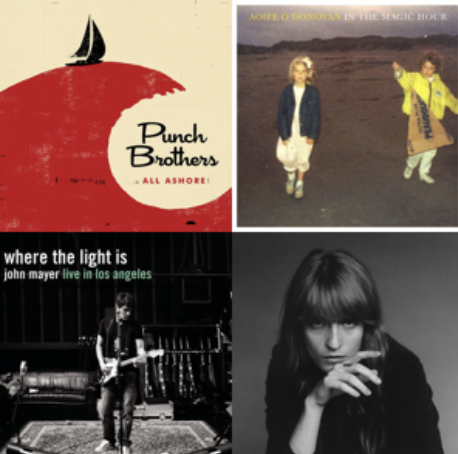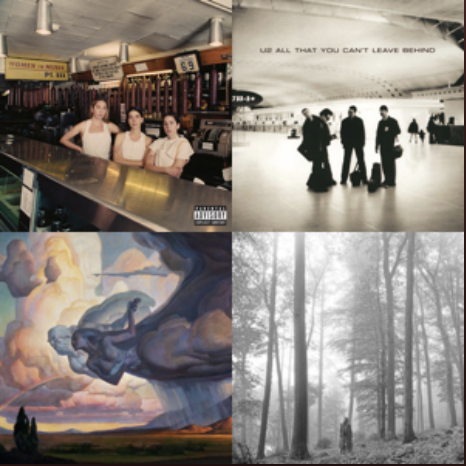Do you think science and the arts have to live in their own hermetically sealed cubes? There are plenty of examples of the arts and sciences not only brushing shoulders but embracing, mingling, intertwining. For a quick and dirty example, you can look to some especially well-written science fiction, the tight bond between mathematics and music, or the work of Leonardo DaVinci. Or one of my favorite and lesser-known examples: the music of the band Hum. What follows is part history lesson, part music review, and part nostalgic reflection on a band that changed my life.
I
To set the scene, let’s take a trip back to 1995. As a young teen, I spent many late nights curled up under my tape deck/radio combo waiting for the right moment to slap the “record” button. Pittsburgh’s alternative rock radio stations usually saved the real oddball tunes for specific late-night time slots, and I often stayed up way past my school-night bed time in the hopes of catching something special.
This is how I discovered Hum: half asleep and then, five minutes later, so awake that I had a difficult time getting back to bed. “Stars,” the band’s only real commercial hit of any sort, was an anomaly on modern rock radio at the time—it didn’t sound anything like the Collective Souls or Silverchairs or Better Than Ezras of the time, and it pulled an effective bait-and-switch that probably blew out more than one set of speakers. “Stars” hypnotized me immediately; the music was loud, yet it possessed a sort of delicateness that surprised me. But there were also these lyrics, like tossed-off poetry written by an asteroid miner.
Hum formed in the Champaign-Urbana metroplex in 1989. After some line-up changes, a terrible self-released debut album (1991’s Fillet Show, 12 Inch Records), and the departure of the band’s initial songwriter/frontman Andy Switzky, Hum’s roster settled on singer/guitarist Matt Talbott, guitarist Tim Lash, bassist Jeff Dimpsey, and drummer Bryan St. Pere (who, as legend goes, was discovered after the rest of the band heard him drumming along to Rush songs as they passed by his home). By the time the band independently released Electra 2000 in 1993, their sound had changed significantly. With Talbott swiveling around in the songwriting seat, Hum’s songs began shifting from a riffy blur between metal and punk to something a more oblique—the post-hardcore riffage is there on Electra 2000, but an attention to sonic atmosphere and texture makes the album a huge step forward from their first record. The galactic heaviness of songs like “Firehead” and “Double Dip” helped the band’s fans label them as “space rock,” as did Talbott’s astronomically rich lyricism. I don’t think it’s a great album, but it drew the band some attention; they soon signed to RCA Records.
II
I’d wager that Hum’s fanbase grew with the release of their third album, You’d Prefer an Astronaut (1995, RCA.). That’s when I came on board, buying their album—one of my first CDs!—from a Super K-Mart after I heard “Stars” on the radio. My parents were mindful of what I listened to, so the fact that a PARENTAL ADVISORY sticker was slapped on the album gave me serious pause . This sticker was like Cerberus, posted to keep me away from the potentially scary things within (even if, in reality, the album didn’t deserve this sticker). But I bought it, and I still have my copy—it’s almost unplayable from all of the use over the years. “Stars” was a minor radio hit, and the album was received well both critically and commercially.
You’d Prefer an Astronaut does a great job of setting up Hum as something uncategorizable. The guitars throb and buzz, a mountain of effect pedals fueling the black hole of melodic noise. Talbott’s quiet, nasally vocals occasionally surface with an elliptic line or two about flashpoints or magnetic brains. The album has the same dreamy qualities that make a lot of shoegaze bands so good, but Hum adds some “oomph” in there as well.
You’d Prefer an Astronaut works well, because while it’s certainly loud, it’s a pop album through and through. Amdist all of the distortion, feedback, and scientifically obscure imagery lurk hooks—sometimes small and subtle, but hooks nonetheless. Tunes like “I’d Like Your Hair Long” and “The Suicide Machine” are a little more straightforward; the sneakier melodies—like the outro of “Why I Like the Robins”— are the ones that get stuck in my head for days.
Hum toured relentlessly to support the release of You’d Prefer an Astronaut, got some exposure thanks to Beavis and Butthead, and gained a supporter in Howard Stern (which they not have been thrilled by, judging from their deadpan response to his fawning). Their success was modest compared to some other alternative rock bands of the mid ‘90s (250,000 albums sold), but Hum was the biggest band in the world to me.
III
It wasn’t a particularly cold or snowy January in 1998. I paced the length of my family’s living room, my nervousness kept at bay by the on-hold music piping through the phone’s receiver. I was about to be patched through to Debbie Wilde, the late-night DJ at 105.9 FM in Pittsburgh. She had just played “Comin’ Home,” the first single from Hum’s upcoming album, Downward is Heavenward. I had good reason to be nervous: in about 30 seconds, I would embarrass myself in front of thousands of listeners with a muffled, nonsensical sermon about the greatness of Hum (despite the fact that at the time I really wasn’t sure what to make of “Comin’ Home”).
Downward is Heavenward received unanimous praise upon its release, and over the past sixteen years it’s built up a reputation as one of the best albums of the 1990s. This adulation, however, didn’t extend to sales. “Comin’ Home” and follow-up single “Green to Me” didn’t even scratch the charts, and the album sold a fraction of the copies that You’d Prefer an Astronaut moved. “Stars” really was a fluke hit. To make things worse for the band, the next two years were a disaster: they missed an opportunity to include their cover of the Police’s “Invisible Sun” on the X-Files: Fight the Future soundtrack, they were eventually dropped by RCA, and they totaled their van while on tour. The toll was too much: the band threw in the towel in 2000.
Which is a shame, considering how confident and well-written Downward is Heavenward sounds: there are layers of precise instrumentation without ever become too ornate. The tunes show quite a bit of diversity in melodies and structure: sweeping prog-rock (opener “Isle of the Cheetah” and the stunning “Afternoon With the Axolotis”), straight-up indie pop (album MVP “Ms. Lazarus”), and whatever “Comin’ Home” is. The album has aged gracefully, too—if anything, I like the album more than when I got it, and it’s gained fans since 1998
Talbott’s lyrics are in top form here, too. The years of touring seemed to have taken an emotional toll on the band, and that’s telegraphed well enough. Many of the songs deal with love, longing, and loss, and the throughline of science fiction elements help emphasize the distance. Between a riff-heavy chorus and watery verses, the progatonist in “Dreamboat” pines for the woman in a water-logged future who is kind enough to pack solar-powered lungs and sub-machines for him.“If You Are To Bloom” uses opaque medical and natural imagery to hint at both yearning and loss. And despite its jaunty nature, “Ms. Lazarus” concerns a time traveler stuck in a heartbreaking situation:
And still the crosshairs rest on one, and still you rest there in the morning sun.
Still I fumble through pages of constructions on the ride.
I like the blown out sound we’ve found, I like the way it feels here coming down.
The way your headstone shines, I only wish that it was mine.
My favorite song on the album, though, is “Apollo,” one of Hum’s few quiet songs. Talbott likens the long hours on the road away from his family to an astronaut drifting in outer space:
She said you can find a place inside my heart if you will stay
and I need you back here on the ground.
It’s lift off, lift off again.
She’s pissed off, pissed off again.
Moonlight brings me back again to stay
and I know if she had a way I’d always be through.
Tethered to a glass ring she keeps beside the phone, and never ever stepping out into…
Yet another long stretch on the road, yet another long time in space.
IV
The years following Hum’s break-up were the most musically fertile of my life. I joined a Hum listserv and, through the interactions there, started a snowball of band discoveries that’s still rolling today. I became a better musician by fumbling along to Hum’s music on guitar. I learned to dig into artists’ harder-to-find material, too, since Hum’s scant b-sides are among some of the band’s best songs (like the superb “Puppets”).
Reflecting on these years makes me thankful for the weird, incredibly creative bands that not only scored record deals, but also crept onto corporate radio stations. This was something magical—maybe even preordained—about tuning in at the right moment to hear something wholly unlike what you’ve heard before. Platforms like Spotify and Rdio have countless songs immediately available, but the serendipity isn’t there. I’ve also learned to be patient over the past 16 years. Will they release any new material? I kind of doubt it, though my heart jumps when I hear about them playing some unrecorded song, like “Cloud City,” live.
The band seems content on the sidelines. Three years after their quiet break-up, the band reformed with similar stealth to play a one-off show at a festival in Alabama. Since then, Hum has played shows here and there, including some well-attended high-profile festival slots. Talbott formed a new band called Centaur, and is a professor (and football coach!) in Illinois. He also runs the excellent Earth Analog Studios. Dimpsey and Lash have kept busy with other bands (Gazelle and the excellent National Skyline for the former, Glifted and Alpha Mile for the latter), and St. Pere has a family and is working in the medical industry.
This is something that’s always made me love Hum: they’re not rock stars. Nor are they poets or astronauts. Matt, Bryan, Jeff and Tim seem like the sort of guys who’d rather watch Star Wars, play D&D, or grab a beer with some friends than be in the spotlight. Considering their music’s artful approach to the cosmos, it makes sense—sometimes the normalest folk peel back the heavens with the most grace.




